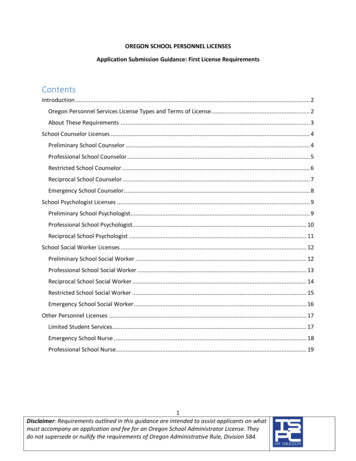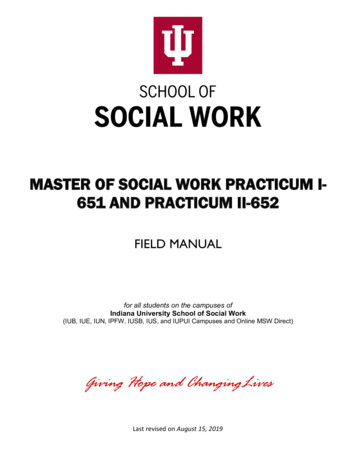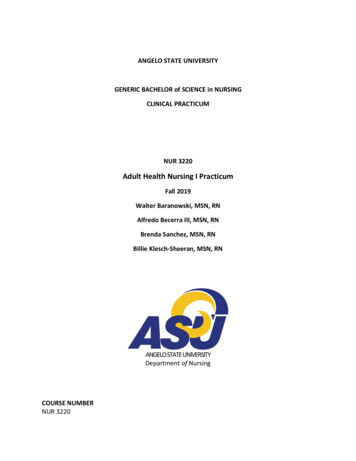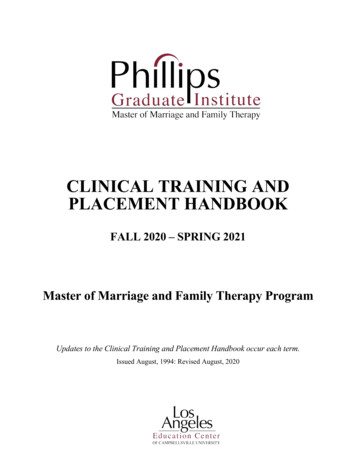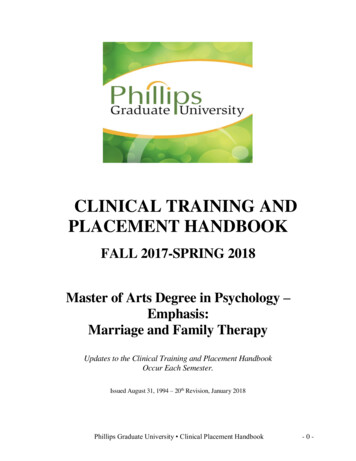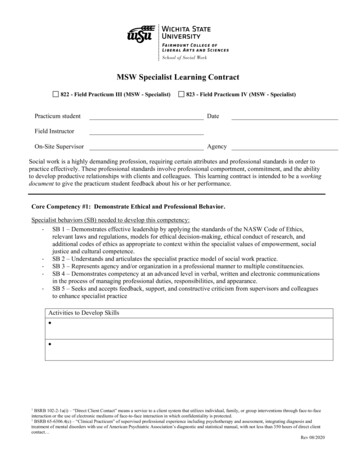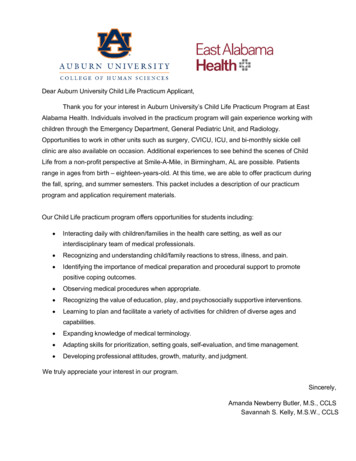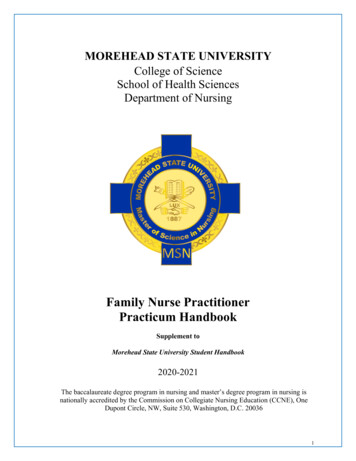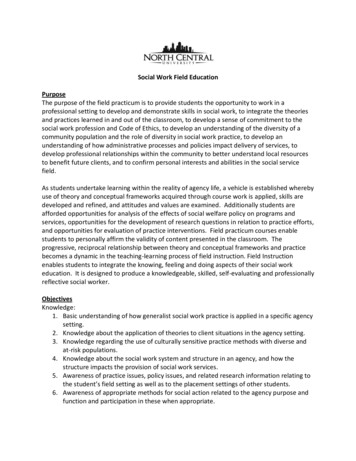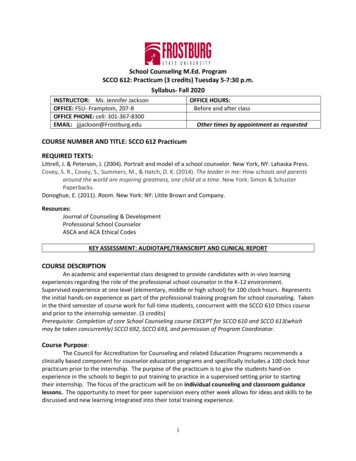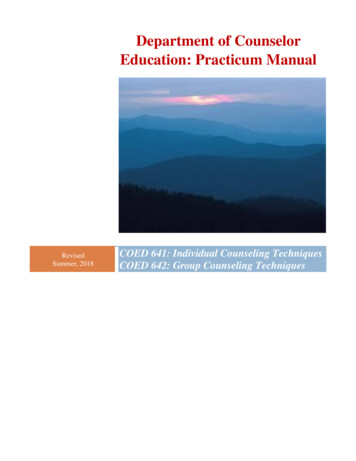
Transcription
Department of CounselorEducation: Practicum ManualRevisedSummer, 2018COED 641: Individual Counseling TechniquesCOED 642: Group Counseling Techniques
Department of Counselor Education: Practicum ManualTABLE OF CONTENTSINTRODUCTION .4PROFESSIONALISM .5ETHICS AND PROFESSIONAL STANDARDS . 5COUNCIL FOR ACCREDITATION OF COUNSELING AND RELATED EDUCATIONALPROGRAMS (CACREP) . . .6STUDENT RESPONSIBILITIES .8THE PRACTICUM EXPERIENCE .10SUPERVISION . .11EVALUATION .12INDIVIDUAL PRACTICUM SITE GUIDELINES .16APPENDIX A: CONTRACTS AND EVALUATIONS .20PRACTICUM STUDENT CONTRACT .22INDIVIDUAL COUNSELOR ASSESSMENT OF PROGRESS 23GROUP COUNSELOR ASSESSMENT OF PROGRESS .27APPENDIX B: INDIVIDUAL PRACTICUM: COED 641 FORMS .33PRACTICUM WEEKLY LOG .34CLIENT PERSONAL INFORMATION FORM .36MINORS INFORMED CONSENT .38INFORMED CONSENT .39Page 1
Department of Counselor Education: Practicum ManualAUTHORIZATION RECORDING FORSUPERVISION .40CONSENT TO EXCHANGE CONFIDENTIAL INFORMATION AND/ORRECORDS 42AUTHORIZATION TO RELEASE INFORMATION . .43BIOPSYCHOSOCIAL FORM .44SUMMARY OF CONTACTS .47IROAP SESSION NOTES 48SESSION ANALYSIS FORM .49PROGRESS/CLOSING REPORT 51TRANSCRIPTION EXAMPLE 52INTAKE PROCEDURE 53COUNSELOR RESPONSIVE REVIEW FORM . .54UNIFORM CASE STUDY .55CLIENT FILE ORGANIZATION SAMPLE .56APPENDIX C: GROUP PRACTICUM: COED 642 FORMS .57PRACTICUM WEEKLY LOG .58GROUP PROPOSAL OUTLINE .60GROUP INFORMED CONSENT .61SESSION AND TREATMENT PLAN .62GROUP ANALYSIS FORM .64GROUP CLOSING SUMMARY .66Page 2
Department of Counselor Education: Practicum ManualAUTHORIZATION FOR AUDIO/RECORDING/SUPERVISION .68APPENDIX D: SUPPLEMENTAL MATERIALS .69SUGGESTED ELECTRONIC SIGNATURE .70PRACTICA SITE: RESOURCES AND CONTACT INFORMATIONRADFORD UNIVERSITY .71CHRISTIANSBURG MIDDLE 72PULASKI .75Page 3
Department of Counselor Education: Practicum ManualINTRODUCTIONWelcome to the challenges and excitement of your practicum experience. Practicum is a closelysupervised experience and an opportunity to further develop your counseling skills. It is also a time tobegin implementing a professional style and approach to serving your clients. The Department ofCounselor Education faculty will assist you through this period of professional and personal growth. Asyou embark upon this journey, embrace the opportunities to develop professionally and personally alongthe road to becoming a more successful, competent, and ethical counselor.The practicum experience is one component of a comprehensive preparation program for counselingprofessionals. Your practicum experiences may help you determine if the counseling profession is agood fit for you. Students enrolled in the Department of Counselor Education program participate in twopractica courses (i.e., individual and group). Students are expected to obtain experience in a broad rangeof skill areas related to individual counseling and group counseling.How to use this ManualAll practicum requirements are your responsibility, so read the manual carefully. Your faculty advisorcan help guide you through this process. The manual contains specific information and a brief overviewof the practica training portions of the School Counseling and Clinical Mental Health Counselingprograms.Page 4
Department of Counselor Education: Practicum ManualPROFESSIONALISMThe Department of Counselor Education expects and requires all students to conduct themselves in aprofessional manner. Professionalism is demonstrated through a series of professional behaviors anddispositions, such as being consistent, being conscientious in performing clinical tasks, being on time tomeetings, communicating effectively with your supervisors, utilizes ethical approaches to counselingclients, and following through on commitments. Additionally, professionals are considered to betrained, prepared and competent in their profession. Your COED faculty members will facilitate andsupport your growth toward becoming a professional counselor.General Expectations for the Practicum ExperienceTwo semesters of practicum will not provide the specialized training necessary for a career incounseling. The practicum experience provides exposure to the field and allows students to apply anddemonstrate newly acquired knowledge and counseling skills within a clinical setting. It enablesstudents to organize, synthesize, process, and apply their classroom information in a manner combiningthe cognitive, affective, and behavioral domains of learning. Again, practicum is part of a longerprocess which will include additional concrete experiences to acquire both knowledge and skills.Comments to the StudentThe practicum experience is an opportunity to blend your knowledge, skills, dispositions, andcounseling philosophy. As you develop a counseling approach, remember that different counselors maywork from different counseling philosophical perspectives. Despite emerging or perceivedinconsistencies between you and other counseling professionals with whom you are working, it isimportant that your behavior remain professional, ethical, and supportive of your peers.ETHICS AND PROFESSIONAL STANDARDSAmerican Counselor Association GuidelinesPracticum students are expected to behave in an ethical manner. The Ethical Standards of the AmericanCounseling Association are the standards to which we subscribe.In practicum you will surely experience the application of these ethical standards and procedures. Forexample, the practicum student must obtain the informed consent of their clients before the start ofcounseling. This process involves: a) Personal Information b) Informed Consent, and c) Authorizationfor Audio/Video Recording. Additionally, practicum students are responsible for protecting theanonymity of their clients. Full names are not to be used, and practicum students will avoiddocumenting information in the session notes and session analyses which may identify a client. Writtenpermission, in the form of a signature, to video record or audio record must be obtained from each clientbefore recording. When counseling minors, parental or guardian consent for participation in counselingis required. The practicum student shall take care to obtain adequate consultation in instances that mayPage 5
Department of Counselor Education: Practicum Manualpresent challenges outside his/her range of competencies. Your practicum course instructor will beavailable for consultation.COUNCIL FOR ACCREDITATION OF COUNSELING AND RELATEDEDUCATIONAL PROGRAMSThe overall objective of practicum is for students to gain experience, develop competencies, integratepast learning experiences, gain insight into theory and technique, and increase self-awareness.CACREP VisionThe vision of CACREP is to provide leadership and to promote excellence in professional preparationthrough the accreditation of counseling and related educational programs. As an accrediting body,CACREP is committed to the development of standards and procedures that reflect the needs of adynamic, diverse, and complex society. CACREP is dedicated to: encouraging and promoting the continuing development and improvement of preparationprograms; and preparing counseling and related professionals to provide services consistent with the ideal ofoptimal human development.CACREP MissionThe mission of CACREP is to promote the professional competence of counseling and relatedpractitioners through: the development of preparation standards;the encouragement of excellence in program development; andthe accreditation of professional preparation programs.CACREP Practicum Standards and the Department of Counselor EducationStudents must complete supervised practicum experience that totals a minimum of 40 hours of directcontact. Each practicum is designed to help students further their counseling skills under supervision.The Department of Counselor Education requires two practicum courses: a) COED 641: IndividualCounseling Techniques, and b) COED 642: Group Counseling Techniques. Twenty (20) hours of directclient contact are required in each practicum course. According to the 2016 CACREP standards forpracticum, the practicum experience includes all of the following:Page 6
Department of Counselor Education: Practicum Manual Students must complete supervised practicum experiences that total a minimum of 100 clockhours over a minimum 10-week academic term. Each student’s practicum includes all of the following: At least 40 clock hours of direct service with actual clients that contributes to thedevelopment of counseling skills.Weekly interaction that averages one hour per week of individual and/or triadicsupervision throughout the practicum by 1) a counselor education program facultymember, 2) a student supervisor who is under the supervision of a counselor educationfaculty member, or 3) a site supervisor who is working in consultation on a regularschedule with a counselor education program faculty member in accordance with thesupervision contract.An average of 1 1/2 hours per week of group supervision that is provided on a regularschedule throughout the practicum by a counselor education program faculty memberor a student supervisor under the supervision of a counselor education program facultymember.The development of program-appropriate audio/video recordings for use in supervisionor live supervision of the student’s interactions with clients.Evaluation of the student’s counseling performance throughout the practicum, includingdocumentation of a formal evaluation after the student completes the practicum.CACREP Clinical Mental Health and School Counseling Practicum StandardsThe following objectives are from the Clinical Mental Health Counseling and School Counselingsections of the 2016 CACREP Standards and apply to student learning during the practicum experience:V.C.3.a. Students conduct intake interviews, mental status evaluations, biopsychosocial histories, mentalhealth histories, and psychological assessments for treatment planning and caseload management.V.G.3.d. Students learn and apply interventions to promote academic development.V.G.3.f. Students learn and apply techniques of personal/social counseling in school settingsV.G.3.h. Students obtain skills to critically examine the connections between social, familial, emotional,and behavior problems and academic achievement.Page 7
Department of Counselor Education: Practicum ManualCACREP Contact InformationFor more information please visit http://www.cacrep.org/template/index.cfm or contactCACREP1001 North Fairfax Street, Suite 510Alexandria, VA 22314Phone (703) 535-5990Fax (703) 739-6209STUDENT RESPONSIBILITIESExpectations of StudentsYou are responsible for knowing and following practicum guidelines. As noted below, failing tofollow these guidelines may jeopardize your success in the practicum courses. If you needassistance, consult your faculty advisor or practicum course instructor. As noted earlier,practicum students must adhere to professional, institutional, and ethical standards. Studentsenrolled in the Department of Counselor Education practicum courses will adhere to thefollowing guidelines:1. Complete the duties assigned to them in accordance with Departmental policies andprocedures, as well as the ethics, statutes, and laws governing the professional practice forcounseling.2. Consult with your practicum instructor regarding the creation of client files. Your instructorwill require you to download copies of all required forms for clinical files.3. Know and meet practicum expectations, guidelines, and procedures as outlined in thePracticum Manual for the Department of Counselor Education, and other programmaticresources (e.g., the Graduate Student Handbook).4. Know and meet all practicum deadlines.5. Ensure that the practicum file material is accurate, current, and complete. For specificinformation, refer to the most recent version of this Manual.6. Practicum students will meet for 1 hour of individual supervision per week with theuniversity supervisor and participate in a minimum of 1.5 hours of in class group supervisionper week.Page 8
Department of Counselor Education: Practicum Manual7. Practicum students will provide recordings of their counseling sessions for review in groupsupervision and/or individual supervision with the practicum course instructor.8. The practicum experience will commence at the beginning of the semester when studentshave (a) completed and submitted the Practicum Contract, (b) registered for and begun thepracticum (COED 641 or COED 642) course, and (c) submitted a copy of their professionalliability insurance coverage.Weekly Log of HoursEach student will maintain and complete an on-going log of accumulated hours attained through thepracticum experience (see Appendix B and C). The log sheet requires students to provide a detailed listof hours accumulated in various activities during the practicum experience. All students completingpracticum course must accumulate a minimum of 50 hours, with 20 of the 50 hours being direct clientcontact hours.Direct client contact hours are gained through individual counseling, small group counseling,psychoeducational group or classroom guidance, and family or parent/guardian meetings. Allother hours can include duties appropriate to the practicum setting or supervision as listed on theweekly log sheets. The weekly log of hours will become part of the student's permanentpracticum record indicating successful completion of the practicum experience, and will be kepton file in the Department of Counselor Education.Professional BehaviorStudents are expected to conduct themselves as professionals. At all times, students areexpected to maintain appropriate confidentiality regarding their counseling activities at the siteand to adhere to the ethical guidelines set forth by the American Counseling Association andthe American School Counselor Association. Students should carry out the duties andresponsibilities of their practicum contract to the best of their ability and meet with theirsupervisor to modify any aspect of the contract which may become problematic. Students areexpected to keep their supervisor informed of their activities, needs, concerns, andaccomplishments with regard to the practicum.ReportsStudents are responsible for seeing that all required forms, evaluations, and reports are completedand submitted to the practicum course instructor. Incomplete forms are a reflection ofprofessionalism and will result in either a lowered grade or no credit for the course.Page 9
Department of Counselor Education: Practicum ManualTHE PRACTICUM EXPERIENCEThe practicum experience is more than a clinical exercise in the Department of Counselor Education andrepresents a significant opportunity for career and personal development. As such, the more time, effort,and resources you commit to this process, the more likely you will be to place your feet firmly on the careerpath that suits your interests, talents, experiences, and training. After a period of settling in, you begin thework of practicum. As the routine becomes more familiar, you will likely feel more relaxed, confident, andunderstand firsthand the scope of experiences available to you.Choosing a Practicum SiteStudents enrolled in the Department of Counselor Education program choose from three practicum sitesfor COED 641. Practicum: Individual Counseling Techniques: Radford University, ChristiansburgMiddle School, and Pulaski High School. While the ―home base‖ for COED 642. Practicum: GroupCounseling Techniques will be in a Radford University classroom, the groups may be conducted invarious settings depending on the counseling focus, and population served. The practica sites and settingsoffer students an opportunity to explore and engage in additional learning experiences.RecordingBoth practica require sessions be recorded and may provide opportunities for live supervision. Managingrecordings facilitates the professional development of students and assists in quality control of servicesdelivered to clients. Practicum students will be instructed to use the Department of CounselorEducation’s Permission to Record form (see Appendix A and B), which is required before students beginto record clients for supervision purposes. (Note: This form is not to be considered as a generalpermission form for students to counsel clients).TerminatingTerminating the practicum generally signals the start of a new beginning. Completing assignments,transferring clients, and saying good-bye to practica colleagues mark this period. It is a busy time that requiresyou to stay focused and energized.Students may be removed from practicum for difficulties in academic performance. Academic performanceincludes demonstrated knowledge, technical and interpersonal skills, attitudes, and professional character.Students may also be removed from practicum based on evidence of incapacity, incompetence, or unethicalbehavior. These are defined as:Page 10
Department of Counselor Education: Practicum Manual Persistent limitations in interpersonal or social relationships characterized by frequentdisruptions in collegial and/or client-counselor relationships, due to factors such as withdrawal,conflicts, inappropriateness, aggressiveness, or hostility; and Persistent inability to carry out the professional functions of a counselor, characterized byfrequent inability to be able to complete complex skills and techniques of the professionwithout assistance or direction.SUPERVISIONPracticum consists of two intense courses (COED 641 and COED 642), where students are not alone in theirexploration of their identity and role as a counselor. Practicum students practice counseling skills, strategies,and approaches under supervised conditions. Student will have both group and individual supervision tohelp them progress through each practicum course. Additionally, your practicum course instructor has a) aminimum of a master’s degree in counseling or a related profession with equivalent qualifications, includingappropriate certifications and/or licenses, and b) a minimum of two years of pertinent professionalexperience in the program area in which you are enrolled. Each practicum course section has a maximumenrollment of six (6) students.Group SupervisionPracticum course instructors for each practicum course will meet with students weekly to discuss issues,concerns, successes, and other circumstances regarding counseling the practicum clients. The group supervisionprocess helps students develop skills and give and receive feedback. Honest communication is crucial tocreating conditions for successful group supervision.Individual SupervisionEach student will participate in a weekly, one-on-one or triadic meeting with their practicum courseinstructor. The supervision session is your time to have the undivided attention and support of yourinstructor. Students need to maximize interaction in supervision and maximize supervision. Studentsshould expect to be challenged, supported, and encouraged to grow. Additionally, students can prepare forindividual supervision by developing a list of questions or specific needs for discussion, and bringing allrelevant materials (i.e., recordings and paperwork) to each supervision session.Page 11
Department of Counselor Education: Practicum ManualEVALUATIONThe practicum course involves both academic and clinical work. Students will be evaluated on theacademic component of the course. This evaluation will be based on attendance, active utilization of groupand individual supervision, timely and thorough completion of weekly reports, performance on all requiredassignments, and evaluations from the course instructor. The practicum instructor will provide on-goingfeedback to students concerning performance of agreed upon duties, as well as overall performance andbehavior in the practicum.Detailed evaluation of the clinical experience is an important part of the student's learning. In addition toprogress toward achieving established goals and progress on assigned projects, evaluations will addressdevelopment of skills needed to complete assignments, attitudes toward working with clients, workingknowledge of site operations, interactions with co-workers or peers, and appropriate use of supervision.The Final Counselor Assessment of Progress and Dispositions will be completed during the final week ofthe practicum by the practicum course instructor.If the practicum course instructor identifies deficiencies in a student’s performance (i.e., professionalbehavior, skill demonstration, or other expectations of the student) and these are not addressed by thestudent after appropriate and timely notification, then the student may be asked to leave the practicum bythe practicum course instructor, or by the program coordinator (i.e., School Counseling or ClinicalMental Health Counseling) in which the student is enrolled. If this occurs, the student will not be placedat a different site to complete the practicum. A remediation plan to address the problem areas will bedeveloped by the student’s faculty advisor. No adjustments to the practicum requirements will be madeto accommodate this remediation process. A student repeating the practicum in a subsequent semesterwill be expected to complete all requirements of the course, with no carryover of completed hours fromthe previous failed attempt.Counseling DispositionsProfessional Dispositions are defined as professional attitudes, values, and beliefs demonstrated through bothverbal and non-verbal behaviors as counselors in training interact with clients, colleagues (i.e., other COEDstudents and supervisors), and faculty (adopted from The National Council for Accreditation of TeacherEducation: NCATE). Your practicum course instructor will utilize the counseling dispositions as goals thatdescribe students' desired behaviors and attitudes as an outcome of their education and are related to realworld functioning (Johnson & Newman, 1996). The counseling dispositions evaluation used by theDepartment of Counselor Education was adapted from McAdams, Foster, and Ward (2007).Page 12
Department of Counselor Education: Practicum Manual1. Openness to new ideas12345ClosedOpenWas dogmatic about own perspective andWas amendable to discussion ofSolicited others’ opinions and perspectivesideas.perspectives other than own.about own work.Invited constructive feedback andIgnored or was defensive about constructive Accepts constructive feedback withoutdemonstrated interest in others’feedback.defensiveness.Showed little or no evidence ofSome evidence of effort to incorporateperspectives.incorporating constructive feedbackrelevant feedback received to change Showed strong evidence of incorporation offeedback received to change own behavior.received to change own behavior.own behavior.2. Flexibility12OpenShowed little or no effort to recognizechanging demands in the professional &interpersonal environment.Showed little or now effort to flex ownresponse to changing environmentaldemands.Refused to flex own response to changingenvironmental demands despiteknowledge of the need for change.Was intolerant of unforeseeable or necessarychanges in established schedule orprotocol.3. Cooperativeness with others1UncooperativeShowed little or no engagement incollaborative activities.Undermined goal achievement incollaborative activities.Was unwilling to compromise incollaborative activities.234Effort to recognize changing demands inthe professional & interpersonalenvironment was evident butsometimes inaccurate.Efforts to flex own response to newenvironmental demands was evidentbut sometimes inaccurate.Flexed own response to changingenvironmental demands whendirected to do so.Accepted necessary changes inestablished schedule or protocol, butwithout effort to understand thereason for them.3Engaged in collaborative activities butwith minimum allowable input.Accepted but rarely initiatedcompromise in collaborativeactivities.Was concerned mainly with own part incollaborative activities.5ClosedShowed accurate effort to recognizechanging demands in the professional &interpersonal environment.Showed accurate effort to flex own responseto changing environmental demands asneeded.Independently monitored the environment forchanging demands and flexed ownresponse accordingly.Attempts to understand needs for change inestablished schedule or protocol to avoidresentment.Accepted necessary changes in establishedschedule and attempted to discover thereasons for them.45CooperativeWorked actively toward reaching consensus incollaborative activities.Was willing to initiate compromise in order toreach group consensus.Showed concern for group as well asindividual goals in collaborative activities.Page 13
Department of Counselor Education: Practicum Manual4. Willingness to accept and use feedback123UncooperativeDiscouraged feedback from others throughWas generally receptive to supervisorydefensiveness and anger.feedback.Showed little or no evidence of incorporation Showed some evidence ofof supervisory feedback received.incorporating supervisory feedbackinto own views and behaviors.Took feedback contrary to own position as aShowed some defensiveness to critiquepersonal affront.Demonstrated greater willingness to givethrough ―over-explanation of ownfeedback than receive it.actions‖ – but without anger.Demonstrated greater willingness toreceive feedback than to give it.5. Awareness of own impact on others12UncooperativeWords and actions reflected little or noconcern for how others were impactedby them.Ignored supervisory feedback about howwords and actions were negativelyimpacting others.6. Ability to deal with conflict12UnableWas unable or unwilling to consider others’points of view.Showed no willingness to examine own rolein a conflict.Ignored supervisory advisement if not inagreement with own position.Showed no effort at problem solving.Displayed hostility when conflicts wereaddressed.7. Ability to accept personal responsibility12UnableRefused to admit mistakes or examine owncontribution to problems.Lied, minimized, or embellished the truth toextricate self from problems.Consistently blamed others for problemswithout self-examination.345CooperativeInvited feedback by direct request andpositive acknowledgement whenreceived.Showed evidence of active incorporation ofsupervisory feedback received into ownviews and behaviors.Demonstrated a balanced willingness to giveand receive supervisory feedback.4Effort to determine how own words andactions impacted others was evidentbut sometimes inaccurate.Respond as necessary to feedbackregarding negative impact of ownwords and actions on others, but attimes, with resentment.35CooperativeEffort toward recognition of how own wordsand actions impacted others.Initiates feedback from others regarding impactof own words and behaviors.Regularly incorporates feedback regardingimpact of own words and behaviors toeffect positive change.4Attempted but sometimes had difficultygrasping conflicting points of view.Would examine own role in a conflictwhen directed to do so.Was responsive to supervision in aconflict if it was offered.Participated in problem solving whendirected.3Was willing to examine own role inproblems when informed of theneed to do so.Was accurate and honest in describingown ad others’ roles in problems.5AbleAlways willing and able to consider others’points of view.Almost always willing to examine own rolein a conflict.Was consistently open to supervisory critiqueabout own role in a conflict.Initiated problem-solving efforts in conflicts.Actively participated in problem-solvingefforts.45AbleMonitored own level or responsibility inprofessional performance.Invited constructive critique from others andapplied it toward professional growth.Accepted own mistakes and responded tothem as opportunity for selfimprovement.Avoided blame in favor of self-examination.Page 14
Department of Counselor Education: Practicum ManualMight blame initially, but was open toself-examination about own role inproblems.8. Ability to express feelings effectively and appropriately123UnableShowed no evidence of willingness andShowed some evidence of willingnessability to articulate own feelings.and ability to articulate own feelings,Showed no evidence of willingness andbut with limited range.ability to recognize and acknowledge the Showed some evidence of willingnessfeelings of others.and ability to acknowledge others’Acted out negative feelings (throughfeelings – sometimes inaccurate.negative behaviors) rather thanExpressions of feeling usuallyarticulating them.appropriate to the setting –Expressions of feeling were inappropriate toresponsive to supervision when not.the setting.Willing to discuss own feelings inWas resistant to discussion of feelings insupervision when directed.supervision.45AbleWas consistently willing and able to articulatethe full range of own feelings.Showed evidence of willingness and accurateability to acknowledge others’ feelings.Expression of own feelings was consistentlyappropriate to the setting.Initiated discussion of own feelings insupervision.9. Attention to ethical and legal considerations12345InattentiveAttentiveEngaged in dual relationships with clients.Was responsive to supervision forMaintained clear pe
contact. Each practicum is designed to help students further their counseling skills under supervision. The Department of Counselor Education requires two practicum courses: a) COED 641: Individual Counseling Techniques, and b) COED 642: Group Counseling Techniques. Twenty (20) hours of direct client contact are required in each practicum course.

